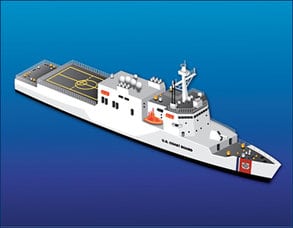
Marking another key step toward recapitalizing its aging fleet, the Coast Guard late Tuesday afternoon awarded preliminary design contracts to three companies, Bollinger Shipyards, Eastern Shipbuilding Group, and General Dynamics [GD], worth a combined $65 million for the Offshore Patrol Cutter (OPC). The awards to Bollinger and Eastern were nearly $22 million each and GD’s Bath Iron Works shipbuilding unit received $21.4 million for the 18-month preliminary and contract design (P&CD) phase, which is the first of a two phase…

 By
By 










